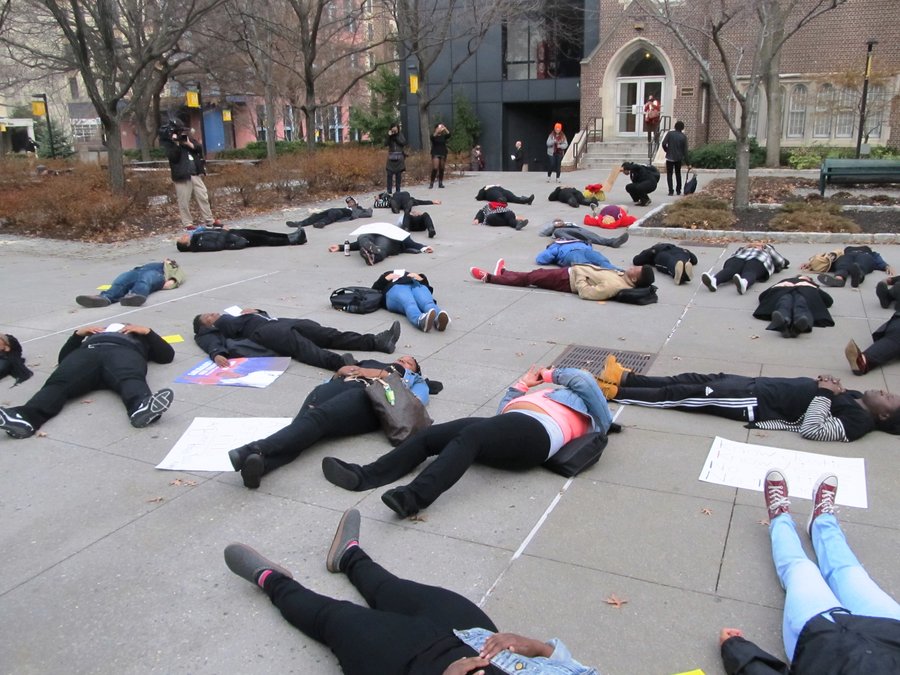Members of the Black Freedom Society (BFS) at New Jersey City University (NJCU) lay prone on the ground for four and half minutes on Dec. 1 – one minute for each hour that the body of Michael Brown was left unattended after being shot by Police Officer Darren Wilson in Ferguson, Mo. on Aug. 8.
This “Die-in” was part of a national protest over a grand jury’s refusal to indict Wilson.
Brittany Henderson, vice president of BFS, said the protest was an attempt to build solidarity against not just this shooting, but a police culture that they believe seems to target black people.
“We want to send a message that it is not okay,” she said. “We want to show that there is a need for more information.”
The protest involved fewer than 100 students, and that was disappointing, BSF President Harold Daniels III said.
“All the students from this university should be out here,” he said.
Unlike protests in Ferguson, the Jersey City protest was designed to educate people – although many of the people involved were emotionally distraught, some crying, some channeling rage through poetry.
“There have been killings in Jersey City,” said Merclay Adams, an organizer from Newark. She challenged criticism of the African-American community and highlighted the historic issues of violence faced by blacks in America.
“Black lives matter,” Adams said. “Yes, all lives matter, but it’s black people who are being killed.”
She said the protest was a call to fix the problem, and the solution has to be more than a hash tag on Twitter. Lack of jobs, educational opportunities, and other social structures in the Greenville section of Jersey City are all part of the historic oppression, she said.
“This is not a black problem, this is a human problem,” said Jazmine Woods, a student at NJCU.
“The cycle ends here today,” said Tosin Mohammed. “We have the power to change. This is not the 1960s. We don’t have to put up with this. We have to educate ourselves and make it better for the next generation of black kids behind us. It has been a long battle and we need for it to end here.”
The students started the protest by laying on the ground at 1:01 p.m., the time when police said Wilson was shot, then began a march around the campus, shouting slogans that reflected both the rich heritage of campus protest and a classic strategy of black protest in America, call and response chants with their roots in the era of plantation slaves. One group called out “Hands up,” another group responded, “Don’t shoot.”
“This could have been any of us,” Daniels said.
In one of the more moving moments, Shayla Cook recited a performance piece called “Teflon Tribe,” and around her, protestors held hands with each other and even sympathetic campus guards.
But the college protestors, as some black leaders elsewhere noted, were among the most successful of people in the black community. They were people who had done everything right, and met the social standard for success. Their protest centered on solutions involving education of the white community that they say oppresses people of color, and education of people of color who need to gain knowledge as a tool to stop the oppression.
Some local African-American leaders said Jersey City was fortunate not to have exploded in violence last summer when there were numerous confrontations between police and local blacks. They referred to the aftermath of the assassination of rookie cop Melvin Santiago, and confrontations over a memorial put up near Ocean Drive in the cop killer’s honor.
Jersey City, Newark, and Paterson will get body cameras for cops
In an attempt to head off some of the problems associated with the Michael Brown killing – where eyewitness accounts differed sharply – Jersey City, Paterson, and Newark will start using body cameras on some police officers
“We are working with Newark and Paterson on a joint purchasing agreement to buy body cameras for our police officers,” said Jersey City Mayor Steven Fulop. “This is something we anticipate rolling out in early 2015 and it will be one of the largest purchases in the country. This measure is a benefit not only for the community, but also for the police officers who are wearing them. And by working together with the two other largest cities in the state, we will be able to save taxpayer dollars through collective purchasing while enhancing public safety.”
The cameras are seen as a layer of protection for both cops and people in the neighborhoods, and would hopefully provide more objective information in case of a dispute.
Rep. Donald M. Payne, Jr. (D-10th District) spoke on the House floor about the work the country must do to move forward following the shooting of Michael Brown.
“The recent events in Ferguson,” he said, “have brought to light many of the problems that still exist in our country: racial divides, mistrust of law enforcement, a judicial system that disproportionately incarcerates black men, and the unfortunate way we view one another – not as Americans, but as ‘us’ versus ‘them.’ I am proud two cities in my district – Newark and Jersey City – are taking the lead by working to acquire cameras for their police officers. I will fight to see that they get the critical funding that they need.”
Al Sullivan may be reached at asullivan@hudsonreporter.com.
